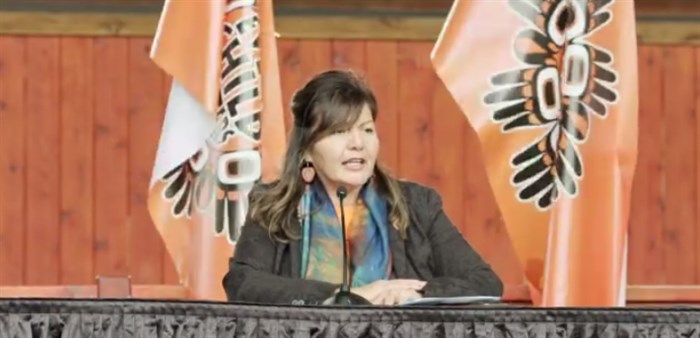
Tk'emlups Kukpi7 (Chief) Rosanne Casimir speaking at an online press conference, Thursday, Sept. 30, 2021, during the first National Day of Truth and Reconciliation.
Image Credit: ZOOM/Tk'emlups te Secwepemc
September 30, 2021 - 11:41 AM
On the National Day for Truth and Reconciliation, Tk'emlups leadership is looking to religious groups and the federal government to take more action before repeating apologies.
Referring to a recent apology issued by the Canadian Conference of Catholic Bishops, Kukpi7 (Chief) Rosanne Casimir said she had a "disturbing sense of deja vu," because it mirrored many apologies already given to the Truth and Reconciliation Commission.
"If this apology is truly a commitment, then Tk'emlups to Secwepemc insists on the complete and full production of all relevant records and documents in a manner and form useful and accessible to Indian Residential School Survivors to help identify those missing children, those unmarked graves and repatriating those lost," Casimir said.
She did, however, call upon the bishops to use their influence to push for an apology from the head of the Catholic Church, as the Pope has refused to offer an apology for the abuses committed at Indian residential schools in Canada.
Casimir spoke at a press conference today, Sept. 30, marking the first National Day for Truth and Reconciliation, formerly known as Orange Shirt Day.
READ MORE: Orange shirts for National Day for Truth and Reconciliation came from Williams Lake
Tk'emlups announced the findings of 215 unmarked graves of children at the former Kamloops Indian Residential School, May 27, which set off a wave of similar searches and renewed demands for reconciliation efforts across the country.
"We have heard time and again from Canada and from the churches, repeatedly, that they will go out of their way to provide the records," Tk'emlups legal counsel Don Worme said at the press conference. "We do not accept those words anymore. Good words are not enough. We want action, and we will hold them to account for their words and for their promises."
In volume four of the Truth and Reconciliation Commission, there are 1,201 named children known to have died at Indian residential schools and 3,201 unnamed, Worme said.
He added that the children buried without names recorded, were also buried without their gender or location identified.
"We had no way to understand how the Indian residential school system dealt with deaths within the institutions, how they informed communities if at all, how they informed families if at all - that information was simply not there," Worme said.
He explained that while there are records kept at Canada's national archives, there have been restrictions placed on when those records can be accessed. Perhaps even more of a set back is that the Commission explained that survivors would require "finding aids" to navigate the records.
READ MORE: Tk'emlups leads Drum for the Children event on National Day for Truth and Reconciliation
"Finding aids are a tool that are designed to assist archivists and researchers to locate records and understand them in the proper context," Worme said. "Those finding aids were not provided... we were provided simple road maps and often were restricted in terms of how and when we were able to access those records, with the end result being that many of those records were not at all accessed."
The press conference precedes an event planned at the powwow arbour that is meant to honour all those affected by the Indian residential school system, and especially the 215 children buried near the grounds at the Kamloops Indian Residential School.
Casimir said she had held hope that Prime Minister Justin Trudeau would attend the powwow grounds on the first National Day for Truth and Reconciliation after sending written invitations, but he did not attend.
Since the ground penetrating radar work was conducted this spring, Casimir said more radar work has been done but they are waiting for the report to come to the Band council before making the results public.
There were 160 acres remaining that the Band intends on searching, but only a fraction of that area has been searched so far.
Casimir said they have found "artifacts" since starting further radar work, but could not give a timeline to when a further update would be released.
READ MORE: Federal Court dismisses feds' Indigenous child-welfare appeals
"This is an agonizing exercise, and it's a grim reminder of this country's history," Assembly of First Nations National Chief Rosanne Archibald said. "We're at the beginning of this process. And so, as we bring them home to rest in peace, we want to offer them ceremony."
There is no indication yet that excavation has started at the grave sites, but Casimir has said that the Band is continuing to work with legal counsel to determine next steps, including continuing efforts to access Indian residential school records.
To contact a reporter for this story, email Levi Landry or call 250-819-3723 or email the editor. You can also submit photos, videos or news tips to the newsroom and be entered to win a monthly prize draw.
We welcome your comments and opinions on our stories but play nice. We won't censor or delete comments unless they contain off-topic statements or links, unnecessary vulgarity, false facts, spam or obviously fake profiles. If you have any concerns about what you see in comments, email the editor in the link above.
News from © iNFOnews, 2021